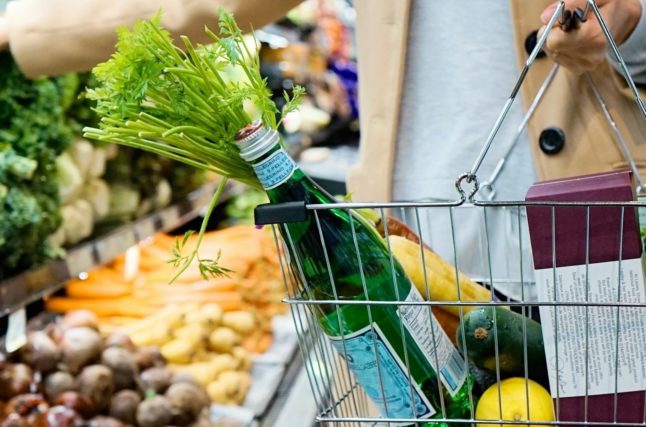The following changes will impact the cost of living in Switzerland, whether for better or for worse.
For an assessment of different types of changes taking place in the new year, check out our following guides.
Everything that changes in Switzerland in 2022
Everything that changes in Switzerland in January 2022
Swiss inheritance law: What will change in 2022
Our daily bread (and cakes and pastries etc etc) to get pricier
A hike in grain prices will see baked goods become more expensive in Switzerland in 2022.
Baked goods will rise by around 15 percent on average, with bakeries, bakery chains and larger supermarkets all expected to raise prices.
Swiss news outlet 20 Minutes put together a summary of how things will look in 2022.
Croissants will cost CHF1.70 on average, while cream slices (Cremeschnitte) will cost CHF4.80.
The Swiss Association of Bakers and Confectioners (SBC) told Switzerland’s Sonntagzeitung newspaper that it had issued a recommendation to raise prices between five and 15 percent.
Furniture
An increase in wood prices will see furniture costs climb in 2022, while delays are also forecast – particularly for people who order custom furniture.
One consequence of the Covid pandemic has been an increase in renovations and home carpentry, which has led to a shortage of timber.
Swedish furniture chain Ikea said it expected increases in the cost of many different furniture items, although it was difficult to say how much prices would increase by in Switzerland or elsewhere as a consequence.
Inflation
In October 2021, Switzerland’s inflation rate rose by 0.3 percent to 1.2 percent, notes the Federal Statistical Office. This is the highest figure since August 2018 and the equal highest monthly increase at any time over the past decade.
Inflation in 2022 is expected to average 1.1 percent across the whole year. While this is high by Swiss standards, it is much lower than most other countries.
How to protect your savings against inflation in Switzerland
First class at second class prices
Switzerland’s SBB has announced a range of new first class upgrades at a fraction of the normal cost. Some first class upgrades are actually cheaper than a point-to-point ticket.
“The primary goal is to make better use of trains that are under-utilised,” said Thomas Ammann, spokesman for the public transport industry organisation Alliance Swisspass.
As the promotion is designed to prevent trains from being under-utilised, it tends to work on a spontaneous basis – i.e. you may not be able to upgrade your travel for the next year.
The ‘spur of the moment’ promotion “allows you to travel in 1st class on one route or for one day” the SBB said.
More information is available at the following link.
Train travel: How you can save on first class upgrades in Switzerland
No discrimination by online stores abroad
Good news for people who like to purchase goods on the Internet: from January 1st, Swiss customers will no longer be denied access to foreign online shopping platforms.
Currently, anyone in Switzerland who tries to access the “.de” or “.fr” version of a merchant site, is automatically redirected to a Swiss sales portal where the merchandise is more expensive. But from January 1st, the law will ban geo-blocking on the internet in this area, a rule in force in the EU since 2018.
No more subsidies for gluten free kids
From January 2022, Switzerland will remove a subsidy payment made to children who cannot eat gluten.
The payments are made to families with children who have celiac disease, which means they cannot consume foods with gluten such as pasta and bread.
The government has come under fire for the removal, with critics saying it places undue pressure on poorer families with children.
READ MORE: Switzerland under fire for cutting payments for gluten free children
Postage costs
Sending letters will get a tad more expensive in Switzerland as of 2022, with Swiss Post increasing prices by up to ten cents per letter. The last time prices were increased was in 2004, 18 years ago.
Prices for sending A-Mail letters will increase by ten cents per letter, while B-Mail will go up by five cents.
Prices for sending packages will remain the same, Swiss Post has promised.
Swiss Post say the increases are necessary due to the decline in the amount of post being sent in Switzerland, which is roughly half of that being sent when prices were last increased just under 20 years ago.
READ MORE: Swiss Post to increase mail prices for first time in 18 years
Postboxes to cost 120 CHF
Swiss Post are also increasing the cost of Post Office boxes.
Anyone who wants a PO box will now need to pay 120CHF per year.
This is a significant increase as the boxes are currently free.
Electricity prices
The cost of electricity will increase slightly for households in 2022, according the Federal Electricity Commission ElCom.
A typical household will pay 21.2 cents per kilowatt hour (ct./kWh) next year, which corresponds to an increase of 0.7 ct / kWh, or 3 percent.
The new cost consists of the tariffs for the use of the network, the tariffs for energy, the charges payable to public authorities, and the surcharge levied on the grid.
READ MORE: How can you save on your household energy bills in Switzerland?
Fuel prices: More expensive petrol
Despite Switzerland’s rejection of a referendum to curb CO2 emissions, petrol prices still look set to climb in 2022.
Currently, everyone who fills their tank pays 1.5 cents per litre for climate protection initiatives. This is set to increase to five cents per litre at the end of 2021 due to the expiration of a subsidy for motorists.
As at late December, this looks set to come into effect at the start of 2022. While the right-wing Swiss people’s party have indicated an opposition to the measure, it has won more widespread favour among the Swiss government.
Unless a change is passed soon, Swiss residents can expect to pay a little more at the pump in 2022.
READ MORE: Where in Switzerland can you find the cheapest fuel?
Basel to put in place minimum wage
In June 2021, Basel City voted via referendum to put in place a minimum wage. While unions wanted a standard of CHF23 – which would equal Geneva’s standard as the highest in the world – voters accepted a government counter proposal of CHF21.
The standard is expected to be implemented in early 2022, although an exact date is as yet unclear.
Five Swiss cantons now have a minimum standard, although Basel City is the first German speaking canton to have such a rule in place.
Reader question: Which Swiss canton has the highest minimum wage?



 Please whitelist us to continue reading.
Please whitelist us to continue reading.
Member comments